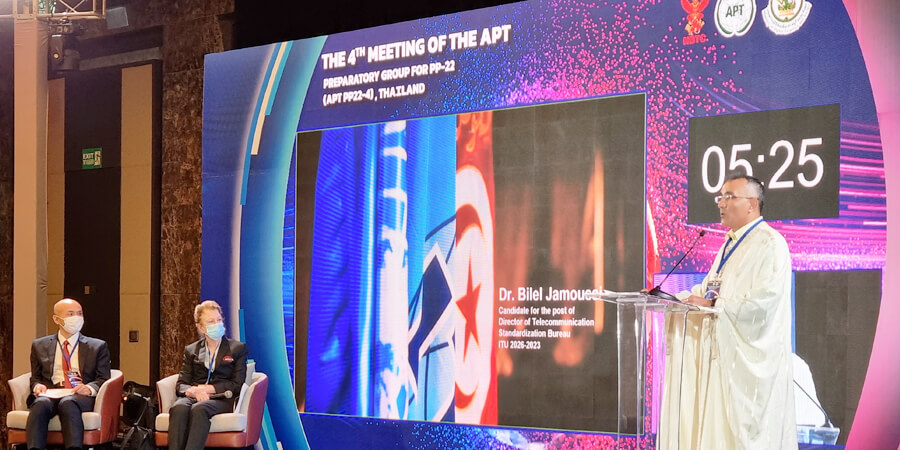The Asia-Pacific Telecommunity (APT) is currently presenting the 4th Meeting of the APT Preparatory Group for PP-22 (APT PP22-4) from 1 to 5 August 2022 in Bangkok, Thailand in a hybrid format. The meeting is hosted by the Office of the National Broadcasting Telecommunications Commission (NBTC) and the Ministry of Digital Economy and Society (MDES), Thailand.
Early in the meeting, His Excellency Riadh Dridi, Ambassador of Tunisia in Thailand, presented on behalf of the Tunisian Government, to the 339 participants, Dr. Bilel Jamoussi as a candidate for the post of Director of TSB.
He stated, “Dr. Bilel Jamoussi is not only Tunisia’s candidate, but he is also the only candidate of the African Union and the League of Arab States for the Standards Bureau. Dr. Jamoussi’s candidacy was endorsed by the African Union during its executive council meeting in 2021 and by the League of Arab States ICT Ministers in Riyadh, Saudi Arabia in 2019.
“Most recently, everyone in ITU witnessed the exceptional performance of Dr Jamoussi before, during and after the WTSA held in Geneva this year, where Dr Jamoussi demonstrated his outstanding capabilities to lead, manage and help member states find consensus on many difficult topics. He is an expert in Telecommunications and holds 23 US patents that he received while working for the private sector in the US and Canada as Director of Standards for 15 years before joining ITU.
“In the 157-year history of the ITU, Africa has never led the Standardization Bureau. This time we objectively have the most qualified and best suited candidate to lead the Standards Bureau.
“Dr Jamoussi election will also bring the much needed and currently missing African representation in the team of 5 elected officials of the ITU, as well as the necessary rotation among the regions for the TSB Director.”
Taking the stage, Dr. Jamoussi in his speech reaffirmed his vision for the Standardization Sector which is based on three pillars: Relevance, Inclusion and Transformational Standards.
According to Dr. Jamoussi, to develop relevant voluntary international standards to connect the world and enable the digital transformation through a consensus-based process, TSB needs a director who can provide to members a neutral and impartial platform for collaborating with other standards development organizations and UN agencies, and presenting a wide representation. Dr. Jamoussi had the privilege of mastering all these skills in 12 years in TSB. For governments and industry, it’s important to provide the best platform for the development of technical standards of fiber optic networks in support of 5G and to efficiently carry 80% of the internet traffic and video compression, to name but a few focuses.
New areas of standards include the uses of Machine Learning and Artificial Intelligence, open source as an emerging tool to manage networks and services as well as the acceleration of sustainable development goals.
Dr. Jamoussi also shared three examples of relevance to the APT:
- Digital Financial Services and Financial Inclusion: “In 2014, we seized the opportunity to secure a 5-million-dollar grant from the Gates Foundation to use mobile phones for financial inclusion in collaboration with the World Bank. We now have many standards in this field.
India hosted the first FIGI Symposium in 2017 in Bangalore that I had the pleasure to lead for ITU.
“We are working with ITU regional office here in Bangkok and area offices in Jakarta and new area office in Delhi to accelerate the implementation in the sub-regional groups like ASEAN thanks to Korean MSIT funding.
“China was one of the three implementation countries of FIGI and the recipient of the ITU award in 2021 for its leadership in FIGI.”
- Smart and Sustainable Cities: “Through the United for Smart Sustainable Cities Initiative, we are implementing the ITU standard on the key performance indicators of smart sustainable cities in over 200 cities worldwide.
“[In] Singapore, for example, we successfully implemented the U4SSC KPIs standard and published the Singapore case study demonstrating how effective this standard is as a policy tool.”
- Focus Group on Aviation Applications of Cloud Computing for Flight Data Monitoring: “This launched in Malaysia in 2014 and led to the allocation of a dedicated frequency for satellite to airplane communication, so that we don’t lose track of airplanes anymore.”
Speaking about inclusion, he highlighted several important pursuits:
- Increasing the participation of developing countries including small islands developing states (SIDS) in standards development through bridging the standardization gap;
- Increasing gender balance by encouraging more women’s participation;
- Ensuring accessible ICTs for people with disabilities and specific needs;
- Continuing to attract Small and Medium Enterprises (SMEs) and Academia, especially from developing countries, to join ITU-T Study Groups.
Lastly, he deliberated on the third pillar which is the implementing of Transformational Standards:
- Reform and restructure ITU-T study groups based on WTSA-20 Resolution 99 to find the optimal structure at WTSA-24 in India, making way for the first WTSA hosted in Asia;
- Innovate and improve the working methods and rules to efficiently hold physical meetings, physical meetings with remote participation and fully virtual meetings. This is important for APT as a region that withstood late evening and night meetings for two years when ITU only operated virtually;
- Manage the transition period during the new building construction phase to maintain an adequate level of service to members. This is an opportunity for APT Member States to host ITU meetings.
At the end of his speech, Dr. Jamoussi promised, if elected, to “hit the ground running and build on our successes immediately without the need for a learning curve. We have no time to waste, and I look forward to working with you in the years ahead to forge a stronger partnership within a more responsive and proactive standardization sector of the ITU.”





